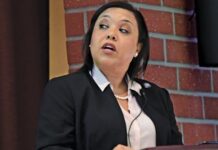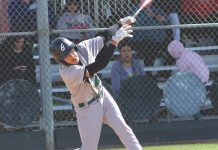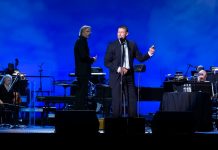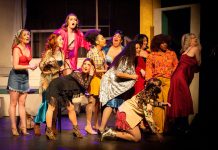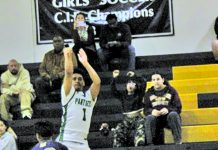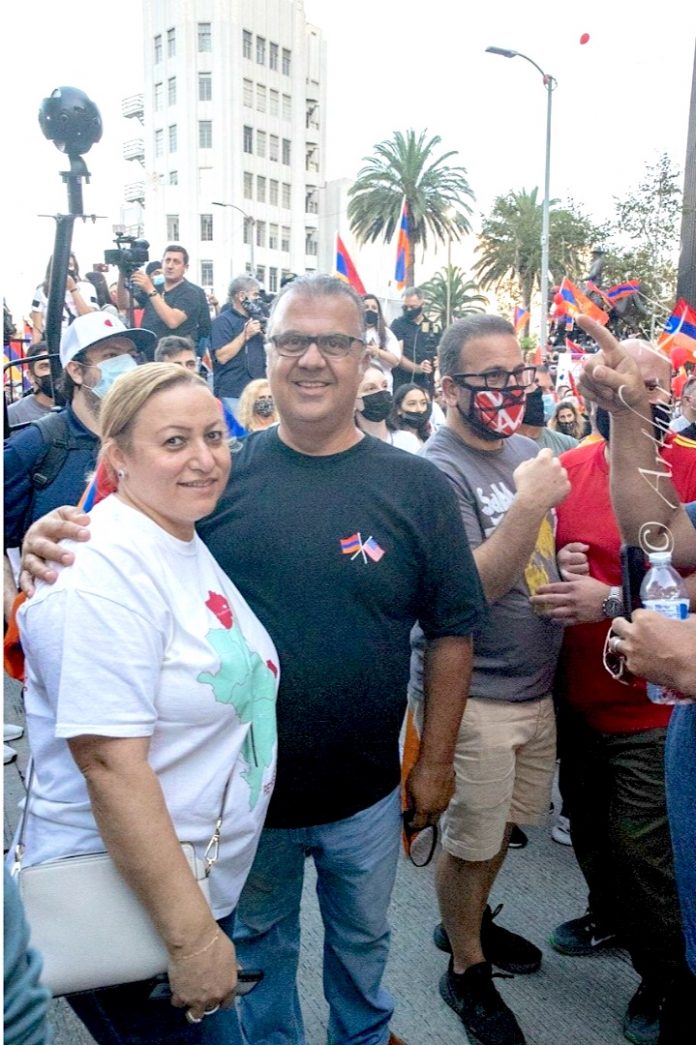
By Gary Kohatsu
Councilman Art Kaskanian is a little past halfway through his first term in public office. Yet, as one of the newer Gardena Council Members, he has been at the forefront of helping the community he has sworn to serve.
Especially evident during the pandemic, Kaskanian has stepped up by securing pallets of drinking water, toilet paper and non-perishable food items.
He has been a champion of senior citizens in particular, some have said.
But few can know Kaskanian’s struggles to also care for his blood brothers and sisters more than 7,000 miles across the world.
As an Armenian American, he is bound by love, honor and duty to join others of Armenian ancestry in demonstrations throughout Los Angeles in recent weeks, as a show of support for Armenians in Nagorno-Karabakh — also known as the Republic of Artsakh.
Artsakh is a disputed ethnic enclave at the center of an escalating conflict between Armenia and neighboring Azerbaijan.
Artsakh is controlled by ethnic Armenians, but exists inside Azerbaijani territory. Azerbaijan has long expressed its intent to take control of the territory.
Kaskanian said Artsakh Armenians are Christian by faith since 301, and the region is sandwich between Turkey and Azerbaijan, two muslim nations with vast military resources.
On Sept. 27, Azerbaijan broke a 26-year-old ceasefire when it launched an attack over the disputed Nagorno-Karabakh region, Kaskanian said.
“I have family there,” Kaskanian told the GVN. “The last time I visited them was in 2016 and they were doing great. Now Azerbaijan attacksand Turkey helped them with military aid.”
Many young Armenian American men have gone back to join the fight against their attackers. Millions of dollars have been raised, including $3 million from the Kardashian sisters, to send relief to the damaged region, Kaskanian said.
“We (Armenians) don’t like war,” Kaskanian said. “If we lay down our weapons and do nothing, it will be a massacre. If Azerbaijan were to lay down their weapons, there will be peace.”
This past Sunday, hundreds of Armenian Americans took their protest to Newport Beach during a visit by President Trump. They joined masses of Trump-MAGA supporters and counter protesters to be heard by the president.
Armenian Americans urged Trump to take action against Turkey, which has pledged support for Azerbaijan, as the two nations have strong ethnic ties.
“I’m disappointed (Trump) is being quiet on the matter,” Kaskanian said. “I think it’s because it’s a business decision. I think he’s protecting his interests; he has hotels in Istanbul, (Turkey), so he doesn’t want to act.”
The Armenian National Committee of American is urging the U.S. to level sanctions against Azerbaijan, in hopes of reaching a peaceful resolution to the conflict.
Kaskanian and fellow Armenian Americans say they want the president to exercise his power in stopping U.S. tax dollars from funding weapons, which they say is being used against Armenian civilians, hospitals and churches.
Just the Sunday before, Kaskian, his family and friends were among the tens of thousands of Armenian American demonstrators who rallied outside the Turkish Consulate in Beverly Hills.
The peaceful protest was a another show of solidarity, Kaskanian said.
Thousands of Armenian Americans marched in unity along Wilshire Boulevard, from Fairfax Avenue and La Cienega Boulevard to reach the consulate.
Kaskanian said during the protest outside of the Turkish Consulate, he happened to speak with a watch commander from the Beverly Hills Police.
“He told me that with all the people gathered there, he couldn’t believe there was not one incident,” Kaskanian said. “I told him that we believe in peace. We have to raise our voices to be heard, but do it peacefully.”
Protesters gathered first at Los Angeles’ Pan Pacific Park before heading to Beverly Hills, it was reported.
A day earlier, there was a gathering of hundreds of peaceful protesters in Glendale.
Besides the Turkish Consulate protest, hundreds of Armenian Americans gathered on Oct. 6 in El Segundo as a stand in solidarity. The protesters took their cry for peace to the Los Angeles Times office, spilling over Imperial Highway between Douglas Street and Aviation Boulevard. Sections of Imperial had to shut down.
Other recent Armenian community demonstrations since the Sept. 27 attack, include the blocking of the 101 Freeway in Hollywood and the 170 Freeway in North Hollywood.
Kaskanian and fellow protesters believe that Turkey and Azerbaijan are attempting to destroy the people of Armenia, in an act of genocide.
The countries of Armenia and Azerbaijan have been at odds over the region since the Soviet Union dissolved in the early 1990s.
Turkey is accused to aiding Azerbaijan with military assistance, Kaskanian said. Turkey is also sending in American-made F-16 fighter jets to help Azerbaijan, which Armenian Americans see as a step toward ethnic cleansing.
Starting in 1915, the death of more than 1.5 million Armenians occurred at the hands the Ottomon Empire, an Islamic superpower, according to History.com website.
The Ottomon was formed by Turkish triada, history tells us.
Kaskanian said the killings of Armenians by the Ottomon Empire was an act of genocide, although Turkey disputes that claim. More than 30 countries including the U.S. recognize the Turkish atrocities against the Armenia as a genocide.
“(Turkey’s president Recep Tayyip) Erdogan wants genocide. That’s what this attack is about,” Kaskanian said. “Between Turkey and Azerbaijan, they will outnumber our military something like 90 million to three million. If they win, it will be over for us. But we will fight because we have no choice. It’s a matter of survival.”



